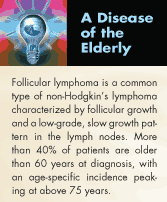Rituximab/CHOP Significantly Improves Outcomes in Advanced FL
Adding rituximab (Rituxan) to CHOP (cyclophosphamide, doxorubicin, vincristine, and prednisone) significantly improves the time to treatment failure and overall survival in elderly patients with previously untreated advanced-stage follicular lymphoma (FL)
• ORLANDOAdding rituximab (Rituxan) to CHOP (cyclophosphamide, doxorubicin, vincristine, and prednisone) significantly improves the time to treatment failure and overall survival in elderly patients with previously untreated advanced-stage follicular lymphoma (FL), according to the results of a prospective randomized trial presented at the 48th Annual Meeting of the American Society of Hematology (abstract 482).
"The addition of rituximab to CHOP was efficacious and had low side effects, suggesting that R-CHOP may offer doctors and patients a better option for treatment of this disease," said lead investigator Christian Buske, MD, of the Department of Medicine, Grosshadern, Ludwig-Maximilians-University, Munich, Germany.
Despite improvements in therapeutic regimens, FL remains incurable in its advanced stages. "Therefore our key challenge for the future is to develop treatment strategies to improve treatment outcome without adding major side effects," he said.
On behalf of his coinvestigators from the German Low Grade Lymphoma Study Group (GLSG), Dr. Buske presented data from the GLSG multicenter phase III, randomized controlled trial of CHOP vs R-CHOP.

The analysis focused on patients over age 60 with advanced-stage untreated FL who were randomized to CHOP alone (n = 112), or rituximab 375 mg/m2 plus CHOP (n = 109). Both groups received six to eight cycles of treatment.
The addition of rituximab to CHOP induced higher overall response rates and significantly prolonged the time to treatment failure (TTF), compared with CHOP alone, Dr. Buske reported. The median TTF for R-CHOP was 5.0 years vs 2.1 years for CHOP alone (P < .0001). The estimated 4-year progression-free survival was 62.2% for R-CHOP, compared with 27.9% for CHOP. Most important, he said, in these older patients, R-CHOP prolonged overall survival, with an estimated 4-year overall survival of 90% after R-CHOP vs 81% after CHOP alone (P = .039).